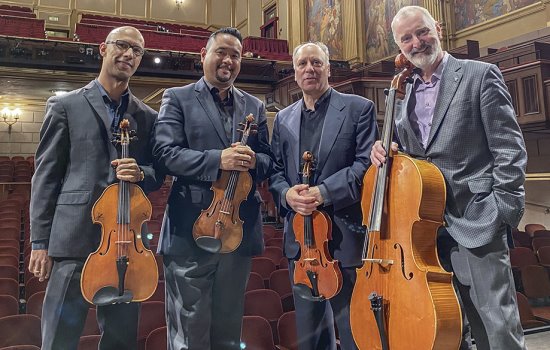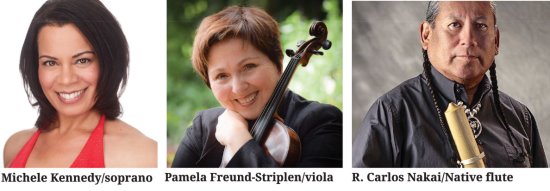 |
|
|
Alexander String Quartet Photos provided
|
|
|
|
|
|
Past, present and future unite in Gold Coast Chamber Players upcoming performance of "A Cultural Crossroads, Black and Indigenous influences on Dvorak in America." Led by Artistic Director Pamela Freund-Striplen, the May 14 concert in Don Tatzin Community Hall at the Lafayette Library and Learning Center offers broad-ranging works that sweep across genres to include pieces by Czech composer Antonín Dvořák, traditional African American spirituals, repertoire from African American pianist and composer Florence Price arranged for soprano and strings, and four selections arranged or composed and performed by Native American flutist R. Carlos Nakai.
 In addition to Freund-Striplen and Nakai, special guest musicians include soprano Michele Kennedy and members of the Alexander String Quartet: Zakarias Grafilo (violin), Fred Lifsitz (violin), David Samuel (viola), and Sandy Walsh-Wilson (cello). A pre-concert discussion at 7 p.m. with Nakai and ethnomusicologist John-Carlos Perea (Ph.D.) introduces concepts central to Native American and Indigenous music, jazz, improvisation, and the impact of those art forms on Western composers and music history.
In addition to Freund-Striplen and Nakai, special guest musicians include soprano Michele Kennedy and members of the Alexander String Quartet: Zakarias Grafilo (violin), Fred Lifsitz (violin), David Samuel (viola), and Sandy Walsh-Wilson (cello). A pre-concert discussion at 7 p.m. with Nakai and ethnomusicologist John-Carlos Perea (Ph.D.) introduces concepts central to Native American and Indigenous music, jazz, improvisation, and the impact of those art forms on Western composers and music history.
 Freund-Striplen says her conversations about the project with Nakai took fascinating and unexpected turns. "When we were speaking about one of his songs, the conversation took a detour to 'blood memory.' He told me that he had always wondered why he was so fascinated with whistles and bagpipes and then discovered that he was actually part Scottish. Most of us are such amazing mixes of cultures and ethnicities."
Freund-Striplen says her conversations about the project with Nakai took fascinating and unexpected turns. "When we were speaking about one of his songs, the conversation took a detour to 'blood memory.' He told me that he had always wondered why he was so fascinated with whistles and bagpipes and then discovered that he was actually part Scottish. Most of us are such amazing mixes of cultures and ethnicities."
 Nakai is of Navajo-Ute heritage and highly regarded worldwide as a premier flutist. His 50-plus albums have sold more than 4.3 million copies during a career that has taken him as a solo artist to stages throughout the United States, Europe and Japan. Cross-genre collaborations have led to projects with composers James DeMars and Phillip Glass, Tibetan flutist and singer Nawang Khechog, the Wilde Boys Trio (with guitarist William Eaton and percussionist Will Clipman), Israeli-born cellist Udi Bar-David, and others.
Nakai is of Navajo-Ute heritage and highly regarded worldwide as a premier flutist. His 50-plus albums have sold more than 4.3 million copies during a career that has taken him as a solo artist to stages throughout the United States, Europe and Japan. Cross-genre collaborations have led to projects with composers James DeMars and Phillip Glass, Tibetan flutist and singer Nawang Khechog, the Wilde Boys Trio (with guitarist William Eaton and percussionist Will Clipman), Israeli-born cellist Udi Bar-David, and others.
 "(Nakai) is open and forward-thinking," says Freund-Striplen. "He remembers but doesn't dwell on the past. One of his main interests is getting native flute music into the mainstream concert hall."
"(Nakai) is open and forward-thinking," says Freund-Striplen. "He remembers but doesn't dwell on the past. One of his main interests is getting native flute music into the mainstream concert hall."
 About Oakland-based Kennedy, Freund-Striplen is equally enthusiastic: "I noticed a similarity between her and R. Carlos Nakai in that neither are very interested in berating people or society for the wrongs that have happened throughout history. They both want to move forward with a spirit of collaboration and I find this very inspiring and essential to my concept for Cultural Crossroads. Michele and I have spoken for many hours about race in America. She is deeply reflective and understands how to speak thoughtfully about difficult subjects. Her choice of spirituals for the program are uplifting and she sings them with a special radiance. She is simply a joy to be around."
About Oakland-based Kennedy, Freund-Striplen is equally enthusiastic: "I noticed a similarity between her and R. Carlos Nakai in that neither are very interested in berating people or society for the wrongs that have happened throughout history. They both want to move forward with a spirit of collaboration and I find this very inspiring and essential to my concept for Cultural Crossroads. Michele and I have spoken for many hours about race in America. She is deeply reflective and understands how to speak thoughtfully about difficult subjects. Her choice of spirituals for the program are uplifting and she sings them with a special radiance. She is simply a joy to be around."
 The three spirituals on the program are "Swing Low, Sweet Chariot," "By an' By," and "My Lord, What a Morning."
The three spirituals on the program are "Swing Low, Sweet Chariot," "By an' By," and "My Lord, What a Morning."
 Two works by Price, "Night" and "Sunset," have been arranged for voice and strings by ASQ's first violinist, Grafilo. For people unfamiliar with Price's legacy, she was the first Black female composer to have a work performed by a major American orchestra when her Symphony No. 1 in E minor had its world premier with the Chicago Symphony Orchestra?in 1933. Having recently completed a
Dvořák chamber music series at SF Performances, Freund-Striplen says the Alexander String Quartet has been "immersed in this special music all season" and contribute an adventuresome, collaborative mindset essential to their participation. "Zak's beautiful arrangement of Mahler songs cycles means that this sort of (adaptation) is definitely in his wheelhouse! The warmth of the soundscape created by string accompaniment supports the voice in a nuanced, vocal way."
Two works by Price, "Night" and "Sunset," have been arranged for voice and strings by ASQ's first violinist, Grafilo. For people unfamiliar with Price's legacy, she was the first Black female composer to have a work performed by a major American orchestra when her Symphony No. 1 in E minor had its world premier with the Chicago Symphony Orchestra?in 1933. Having recently completed a
Dvořák chamber music series at SF Performances, Freund-Striplen says the Alexander String Quartet has been "immersed in this special music all season" and contribute an adventuresome, collaborative mindset essential to their participation. "Zak's beautiful arrangement of Mahler songs cycles means that this sort of (adaptation) is definitely in his wheelhouse! The warmth of the soundscape created by string accompaniment supports the voice in a nuanced, vocal way."
 Turning the focus to Dvořák and the interwoven techniques, textures, rhythms, timbres and melodic motifs that demonstrate the composer drawing on Black and Indigenous music, Freund-Striplen says the opening of
Dvořák's string quartet "American No. 3, Op. 97," sounds like "a reconfiguring of `Swing Low, Sweet Chariot,' the first spiritual that Dvorak ever heard." The simple melody is therefore familiar, even to people who've never before heard the work. "There are drumming effects in the quintet that are evocative of Native culture. Rhythmic pizzicato sections really sound like something you might hear in a ceremony, and the second movement even starts with a solo drum beat in the second Viola, all on an F-sharp," she adds.
Turning the focus to Dvořák and the interwoven techniques, textures, rhythms, timbres and melodic motifs that demonstrate the composer drawing on Black and Indigenous music, Freund-Striplen says the opening of
Dvořák's string quartet "American No. 3, Op. 97," sounds like "a reconfiguring of `Swing Low, Sweet Chariot,' the first spiritual that Dvorak ever heard." The simple melody is therefore familiar, even to people who've never before heard the work. "There are drumming effects in the quintet that are evocative of Native culture. Rhythmic pizzicato sections really sound like something you might hear in a ceremony, and the second movement even starts with a solo drum beat in the second Viola, all on an F-sharp," she adds.
 The pentatonic scale often used in Czech folk music is also common to Native and African American traditional music, another connection between
Dvořák and American music.
The pentatonic scale often used in Czech folk music is also common to Native and African American traditional music, another connection between
Dvořák and American music.
 "Goin' Home," the third Dvořák composition arranged for soprano, strings and Native flute features a melody that comes from an English horn solo in the composer's "New World Symphony."
"Goin' Home," the third Dvořák composition arranged for soprano, strings and Native flute features a melody that comes from an English horn solo in the composer's "New World Symphony."
 "For a long time, people thought that Dvorak had borrowed a spiritual and inserted it into his famous Symphony, but actually, it is original music inspired by the spirituals that he heard on a regular basis from (African American composer) Harry Burleigh," Freund-Striplen says. "What I find really interesting is that a student of Dvorak's excerpted the melody, created words to it, and then it did become in fact a spiritual. It's the perfect way to end the program."
"For a long time, people thought that Dvorak had borrowed a spiritual and inserted it into his famous Symphony, but actually, it is original music inspired by the spirituals that he heard on a regular basis from (African American composer) Harry Burleigh," Freund-Striplen says. "What I find really interesting is that a student of Dvorak's excerpted the melody, created words to it, and then it did become in fact a spiritual. It's the perfect way to end the program."
 To purchase tickets, visit gccpmusic.com.
To purchase tickets, visit gccpmusic.com.
|

